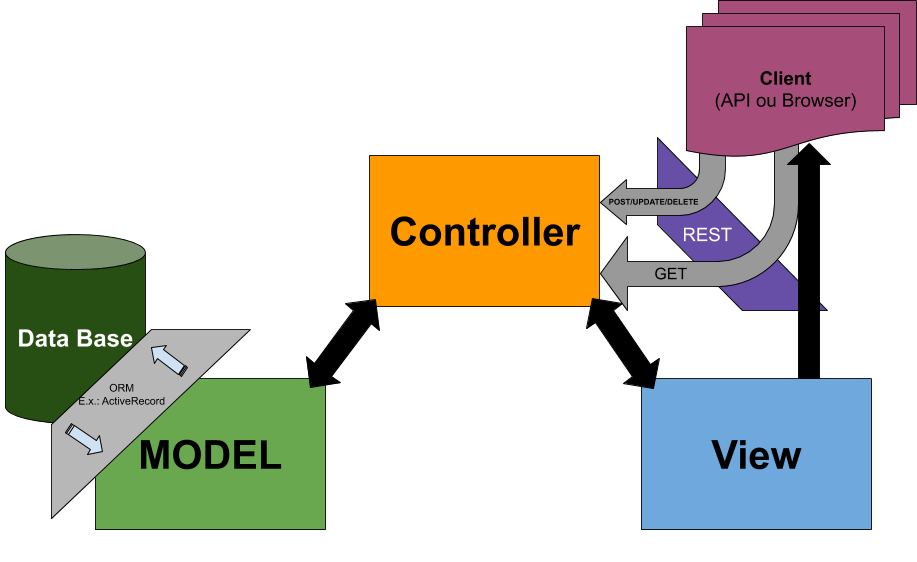Skinny Controller and Fat Model, but don't lose focus

Jamis Buck wrote the famous post Skinny Controller, Fat Model, it has become almost the mantra for the MVC pattern - Model-View-Controller. In this case, all logic that isn’t related to client/user response - View-Controller - must be inside the model, to keep response simple or rather, “skinny”.
Why is that? Simple, because of the code organization and tests. If some part of your code is responsible for communication, it’s expected that, and only that, communication tests will be done for that related part of code.
But What is MVC?
It is a software design pattern that proposes a separation of concepts in three interconnected layers, where the presentation of data to the users (or clients) is away from the part that interacts with the database, aka “it protects the business logic”.

It’s commonly applied along with the DRY concept - Don’t Repeat Yourself - focusing on not repeating code, but reusing it, which facilitates refactoring and debugging.
Coding and exemplifying
For us to understand the “Fat Controllers” problem, let’s take an example - in a silly Ruby on Rails application, given a Post model, we have the following PostsController:
class PostsController < ApplicationController
...
def index
@posts = Post.all
end
...
end
So then came the demand for the user to be able to search in Posts. One solution, with poor thought, could be:
class PostsController < ApplicationController
...
def index
@posts = search_posts
end
...
private
def search_posts
entries = Post.all
if params[:q].present?
entries = entries.where(
%(
unaccent(title) ilike unaccent(:term)
OR unaccent(subtitle) ilike unaccent(:term)
OR unaccent(content) ilike unaccent(:term)
),
term: "%#{params[:q]}%"
)
end
entries
end
end
...
end
Can you see the problem? It makes no sense for the Controller to have a search logic. If the Post
model has been read, then why don’t we move the search_post method to the Post itself? It could
also be named as search and called as Post.search(<args>), which is more intuitive, by the way.
Besides organizing the logic, we can now keep all tests related to Posts - validation, search,
ranking etc - under it instead of running them for the Controller. This example is also breaking
the MVC pattern, the controller has database calls logic when this is the model’s responsibility.
Note: I’m not going to discuss the merits of the search performance here, which by the way is
terrible with all these ORs in the SQL query, it doesn’t consider typos and cohesion of the
searched phrase. In short, it just removes accents with unaccent from PostgreSQL. There are
innumerable Full Text Searching techniques such as lexical indexing, wildcards, word ranking etc.
But that’s a topic for another time, who knows. ➠
Optimized text search with pg_search gem
It’s always good to control cholesterol
Obese models are also a problem. This can demotivate you to follow the mentioned patterns, but when we deal with an extensive and complex logic of a class or file, it is much easier to “dilute” it if it is focused on the same context, on a specific set of responsibilities.
The oriented object programming itself has innumerable strategies as composition, inheritance and delegation. Abstracting a class with inheritance, for example, can be harder if it is responsible for several tasks from different contexts, also, it will be even more so if these tasks and contexts were mixed up or not well defined. Often it isn’t about a technical issue, unlike with the code, but understanding what you want to do.
“Don’t panic.” - The Hitchhiker’s Guide to the Galaxy
In Rails we can get around the “extensive codes” with concerns, services and even jobs
depending on your goal. It is worth emphasizing again the importance of focusing on each class
feature in order to better granulate the whole. In the coded example, it may happen that not only
Post has search, but other models like Comments, Papers etc. This calls (or “smells” if you’re
a fan of Code Smell term) for us to move the method to a concern, something like SearchConcern
without being creative, which can be included in the “searchable models” of our application whether
existing or future. See that with this, in addition to slimming the Model, the granulation made
throws the functionality and complexity of searches into a single file, thus keeping the focus of
features for that snippet of code.